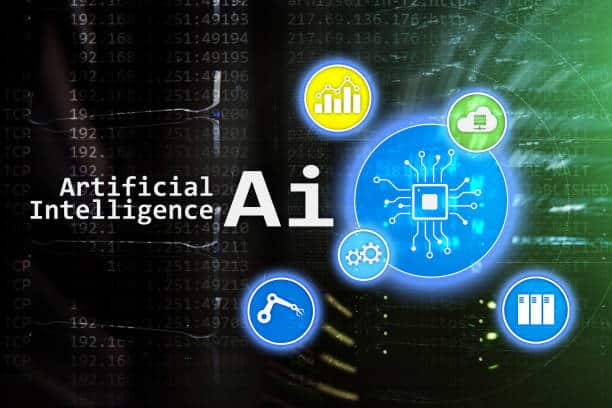Artificial Intelligence in Business Operations As organizations generally embrace the simulation of intelligence, it opens up new areas of productivity, insight accuracy and customer engagement, promising a period of unparalleled growth and development. This groundbreaking innovation mechanizes routine tasks as well as reforms market direction and processes, giving the upper hand to the global sector.
Be that as it may, the road to human-made intelligence integration is fraught with complications. Ethical concerns about tilt, hedging bets, and difficulties of independent potential interest are careful consideration. In addition, the fruitful organization of information simulation requires enormous interests in promoting and framing the two abilities.
The benefits of simulated intelligence in business

Expanded effectiveness and efficiency
The combination of man-made brain power (computer-based intelligence) in business tasks has become a foundation for achieving increased efficiency and effectiveness in different fields. This ground-breaking innovation has the potential to reclassify conventional business work processes, making them smoother and more powerful.
By taking on trivial, day-to-day operations, simulated intelligence allows workers to zero in on their efforts in areas that require human knowledge, imagination and basic logic. This change not only improves representational completion by reducing the burden of tedious work, but additionally substantially supports overall performance.
The great expected of simulated intelligence in business, from robotic labor to reshaping customer partnerships and dynamic cycles, is explored from top to bottom in Business visionary’s examination of the pros and cons of AI
2. Improved accuracy and direction
Anthropogenic consciousness (artificial intelligence) in business has caused a surprising disruption to information review and dynamic circles. Simulated intelligence achieves the search of massive data sets with exceptional computing power to reveal valuable experiences with unrivaled accuracy – giving organizations acceptance of significant insight at scale that empowers vital choices with reduced safety reserves.
The predictive capabilities of simulated intelligence give organizations a significant advantage in being aware of market patterns, spotting inside and outside buyer behavior patterns, perceiving risks and surprising open doors, and anticipating market developments with greater accuracy than conventional measurement strategies.
3. Further development of the customer experience
Human brain power (simulated intelligence) can significantly impact the customer experience by offering unparalleled degrees of personalization and continuous assistance – generally altering the way organizations interface with customers. A critical advantage of simulated intelligence lies in personalization:
using customer information review to tailor items, administrations and matches directly to individual inclinations – this approach not only guarantees that customers receive contributions tailored to meet their unique requirements and wants, but additionally substantially helps fulfillment levels and cultivates loyalty among existing and new customers. same.
The benefits of artificial intelligence in business operations
Intelligence innovation simulation games have had a huge impact in helping business efficiency and proficiency. Here are some benefits of simulated intelligence in business tasks:
Robotizing Monotonous
Business Information simulation innovation can automate tedious operations such as information department, invoicing and customer assistance, saving time and cost for the business. Computerizing these engagements reduces the give and take and saves reps’ time to zero in on additional complex and important tasks.
Further developed Accuracy
Simulated intelligence computations can analyze massive information indicators accurately and productively. This capability empowers organizations to make informed choices in the face of information-driven experiences. With simulated intelligence, organizations can eliminate manual blunders and increase the accuracy and precision of their operations.
Directional Improvement

AI can analyze a lot of information to provide insights and expectations that empower organizations to make informed choices. This ability reduces the odds and limits the mystery which will make the activities more smooth.
Advanced Information Research
Organizations can use computer-based intelligence to take advantage of advanced information review strategies, such as artificial intelligence and predictive analytics, to obtain useful data from giant and confusing datasets. Organizations can use this information to find buying patterns, buyer inclinations and business opportunities.
Continuous Learning and Improvement
Intelligence simulation frameworks can continuously gain from new information and adapt their calculations, causing continuous improvement and advancement of business processes. This enables organizations to remain nimble, adapt to changing financial situations and improve even more successfully.
Human intelligence and Business

Man-made brain power is not just an idea that represents things to come. the unique advantage has previously begun to reclassify the business scene. Devices that engage with simulated intelligence, such as MeaningCloud, offer organizations the ability to automate a variety of operations that would normally require human intervention. We should consider chatbots, for example.
These wonders of computer-based intelligence have slowly taken control of customer support jobs in different businesses. Wendy’s, the famous cheap food chain, is a demonstration of this pattern, having partnered with Google to send an artificial intelligence chatbot that oversees order processing, a job normally performed by humans. Supporting customers in the past, simulated intelligence has changed information research within business operations.
Organizations generate vast amounts of information that can be overwhelming for humans to physically dissect. Computer-based intelligence devices, equipped with sophisticated calculations and artificial intelligence capabilities, can explore these seas of information quickly and accurately, revealing important buying patterns and insights into buyer behavior that would be almost unimaginable to experts.
The ways in which computer-based intelligence can be tuned into business operations for best effect
The involvement of artificial intelligence in business tasks is not only about efficiency. it’s about change. Perhaps the most promising application of computer-based intelligence lies in robotics. This can redefine ventures by improving cycles and reducing human error. Through the computerization of dreary operations, workers can focus on higher-demand tasks that require imagination and critical thinking, upgrading both efficiency and job fulfillment.
conclusion
Unlocking Potential with Human Intelligence Addressing human intelligence capability has evolved to become an important component of business operations. As innovation continues to advance, AI can improve efficiency and effectiveness while managing costs.
The ability to accurately analyze information and make judgments in light of that information faces a huge benefit from human-made intelligence. In addition, simulated intelligence can help organizations pursue dominant choices by providing insights into buyer behavior or market patterns. This knowledge can then be used to calibrate promotion methodologies or to devise new elements that cater to shopper requirements even more.
In conclusion, as human intelligence is shown to be gradually woven into the fabric of business tasks, there will be increased interest in people skilled in this area. Therefore, an interest in teaching agents about computer-based intelligence and how it can extend their work could give the mall the upper hand. In summary, unlocking the capability of artificial intelligence is an undeniable requirement for organizations hoping to stay ahead and improve their overall presentation.

